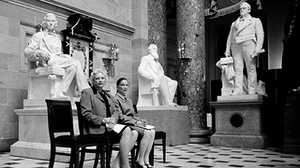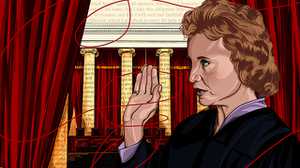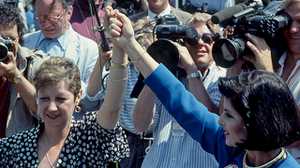On Being the First Woman on the Supreme Court
A friend and former law clerk of Sandra Day O’Connor reflects on her pioneering career.

The nomination
I was driving to work. On my car radio I heard President Reagan, and he’s saying, “She is truly a person for all seasons.” But I had missed the first part of it where he said the name of the person he was nominating, and he didn’t say her name again throughout his remarks. So after he finished this short statement, somebody came on, one of the commentators, and said who he had nominated.
And I just burst into tears. I pulled my car off to a side street and just sat there and cried for a while until I could get back under control and drive to work.
I think the women hoped that she would be a voice for women’s rights, that she would be a voice against discrimination against women and other protected groups. I think women expected that she would be supportive of women’s groups and issues. And she was.
She was always, in my experience, very much in favor of women being given equal opportunities. She was always very much in favor of the laws that gave women equal employment opportunities, equal credit opportunities. She was very supportive of women’s bar associations and the National Association of Women Judges. She was always willing to lend her time and her name and support for those things.
Discrimination and access
She liked to say that she didn’t feel she had been discriminated against, and yet, when you hear her tell her stories about the way she was treated by fellow state senators, it’s obvious that she was. [It] was obvious to her. Her classmate Bill Rehnquist is clerking for the United States Supreme Court, and she’s working initially for no money for a county attorney’s office.
People wouldn’t interview her and hire her. So on some level, she expected to be treated fairly with the men, but she got a real education in that she would not be pretty early on. So it seems clear to me that she was discriminated against. It’s not really surprising, when you think about how she was raised, that she came with the expectation that hard work and ability would overcome any other potential problems.
Growing up on [a] ranch she was treated equally. She was expected to do the same things that the men on the ranch did. She was expected to be able to hold up her end of the bargain. She was expected to be able to help with roundups and whatever it was that needed to be done.
She grew up in Eastern Arizona, went to school in Texas, and the West was different in its view of women and the value of women than some parts of the country. Arizona was a community property state, women had some property rights that people in common law states didn’t have, and it was much more an even playing field. So she grew up in an atmosphere where she was expected to do the same and was treated much the same.
Commitment to fairness
She did so much for so many people to help them along the way, to encourage them, to push them, to make opportunities where she could, to remind people that there needed to be women on commissions and committees. A lot of what she did probably no one saw, because it was when she was meeting with people and saying, “I don’t see any women in this room,” and then they would go find some women to be part of the group.
She of course didn’t like to call herself a feminist, although in my view, she clearly was. There’s no question. She believed women should be able to be on an equal footing with men. The most basic tenant of feminism. I think the reason she didn’t say she was a feminist was because her view of a feminist was somebody who was demonstrating in the streets.
If you take away that kind of stereotype of feminists in the 1970s, then you look to see what was the role of the women’s movement? It was to remove barriers to women so that they were able to do what they wanted to do. It was to remove barriers within employment, within education, and all of those things were things that she had found a way around without the benefit of the laws that helped women later. Nothing would frustrate her more than to suggest a woman wasn’t able to do a job, because that’s not the way she was raised. It’s not the way she lived her life. It’s not the way she acted.
She did become noted for the diversity of her law clerks, and this obviously was a very deliberate act on her part. She noted—and it’s pretty obvious—that almost all the law clerks come from just a few law schools. Almost all the law clerks come from just a few circuit court judges. And she knew there were a lot of other people out there who were qualified to work as a clerk at the Supreme Court.
So she broadened the law schools that she hired law clerks from. She brought in more women as law clerks. More diversity in terms of physical ability. I think this is something that people don’t understand totally about her when they ask about her views toward discrimination. Her view simply was that nobody should be prevented ever from doing something they’re qualified to do. Whether it was women, whether it was African-Americans, whether it was Hispanics, nobody should be disqualified from doing something because of a particular characteristic. And that was just as clear to her as anything ever could be.
So it’s not surprising that she found a way to add more diversity to her law clerks, because she was in a unique position to give people an opportunity that really would help them in their later career. Being a Supreme Court law clerk is a big advantage to people, and I really always thought she just couldn’t bear the notion that some people couldn’t reach their full ability. And so if she could do something to move it along, she would.
From her opinions and what she wrote, you can see her attempt to come to a standard that she thought was both applicable and protective of all the parties involved in that decision. Her opinions were for the most part limited to the issues that came to the Court. She regarded that as the appropriate approach for the Court to take, not to make broad, sweeping generalizations, but to decide the case before them.
Our interview with Ruth McGregor has been edited for clarity. McGregor was Justice O'Connor's former clerk at the Supreme Court in 1981 and a longtime friend.







